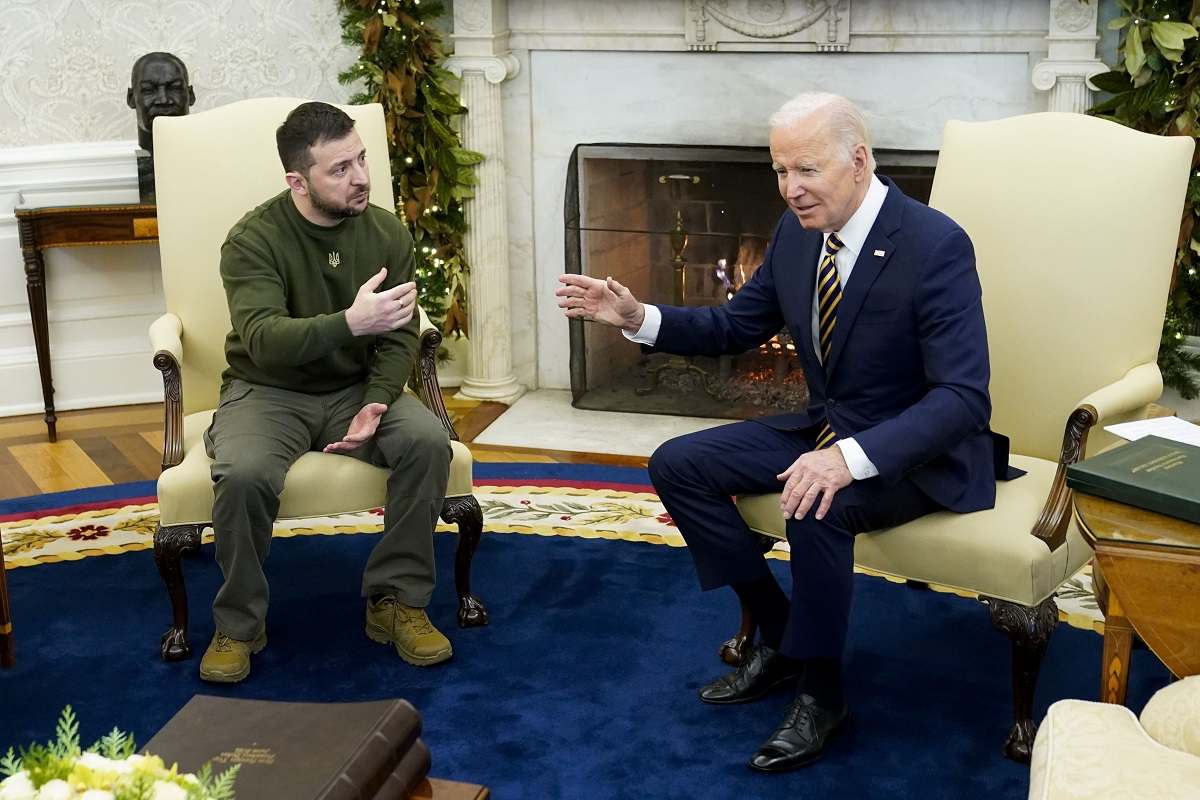
President Joe Biden speaks with Ukrainian President Volodymyr Zelenskyy as they meet in the Oval Office of the White House, Dec. 21, 2022, in Washington.
16:29 JST, February 15, 2023
WASHINGTON (AP) — Support among the American public for providing Ukraine weaponry and direct economic assistance has softened as the Russian invasion nears a grim one-year milestone, according to a new poll from The Associated Press-NORC Center for Public Affairs Research.
Forty-eight percent say they favor the U.S. providing weapons to Ukraine, with 29% opposed and 22% saying they’re neither in favor nor opposed. In May 2022, less than three months into the war, 60% of U.S. adults said they were in favor of sending Ukraine weapons.
Americans are about evenly divided on sending government funds directly to Ukraine, with 37% in favor and 38% opposed, with 23% saying neither. The signs of diminished support for Ukraine come as President Joe Biden is set to travel to Poland next week to mark the first anniversary of the biggest conflict in Europe since World War II.
“I am sympathetic for Ukraine’s situation and I feel badly for them, but I feel like we need to first take care of priorities here at home,” said Joe Hernandez, 44, of Rocklin, California.
Hernandez, a Republican, added that it’s difficult to support generous U.S. spending on military and economic assistance to Ukraine when many American communities don’t have the resources to deal with the ramifications of migrants crossing into the U.S. at the southern border, a rise in drug overdoses caused by fentanyl and other lab-produced synthetic opioids, and a homelessness crisis in his state.
Biden has repeatedly stated that the United States will help Ukraine “as long as it takes” to repel the Russian invasion that began on Feb. 24 of last year. Privately, administration officials have warned Ukrainian officials that there is a limit to the patience of a narrowly divided Congress — and American public — for the costs of a war with no clear end. Congress approved about $113 billion in economic, humanitarian and military spending in 2022.
The poll shows 19% of Americans have a great deal of confidence in Biden’s ability to handle the situation in Ukraine, while 37% say they have only some confidence and 43% have hardly any.
Views of Biden’s handling of the war divide largely along partisan lines. Among Democrats, 40% say they have a great deal of confidence in Biden to handle the situation, 50% have some confidence and 9% have hardly any. Among Republicans, a large majority (76%) say they have hardly any confidence. Those numbers are largely unchanged since last May.
Janice Fortado, 78, of Ipswich, Massachusetts, said Biden deserves credit for his handling of the war. She agreed with Biden’s hesitance early in the war about sending advanced and offensive weaponry out of concern that it would give Russian President Vladimir Putin a pretext to expand the war beyond Ukraine and spur a larger global conflict.
But as the war has dragged on — and Ukrainian forces have held up against a more formidable Russian military — some of that resistance has melted away. Biden has approved sending light multiple rocket launchers known as HIMARS, Patriot missile systems, Bradley fighting vehicles, Abrams tanks, and more. Biden, however, continues to balk at Ukraine’s request for fighter jets.
“As my opinion evolved, I came to wish we had offered more to Ukraine sooner,” said Fortado, a Democrat, who added that she hopes the U.S. and allies change their mind on the fighter jets. “We seem to have done a drip, drip, drip. I understand why it is they were hesitant, but we are now beyond that point.”
House Speaker Kevin McCarthy, R-Calif., before winning the speakership, vowed that Republicans wouldn’t write a “blank check” for Ukraine once they were in charge. And some of the most right-leaning Republicans lashed out at Senate Minority Leader Mitch McConnell of Kentucky over his support of a $1.7 trillion spending bill passed in December that included about $47 billion for Ukraine.
Alex Hoxeng, 37, of Midland, Texas, said he expected Republicans to take a tougher line on Ukraine spending.
“I think Biden isn’t worried enough about inflation,” said Hoxeng, a Republican. “We should just stay out of it. Ukraine is halfway around the world and we have our own problems.”
A majority of Americans, 63%, still favor imposing economic sanctions on Russia, the poll shows, though that too has decreased from the 71% who said that in May 2022.
And 59% say limiting damage to the U.S. economy is more important than effectively sanctioning Russia, even if that means sanctions are less effective. Almost a year ago, in March 2022, the situation was reversed: 55% said it was a bigger priority to sanction Russia effectively, even if it meant damage to the U.S. economy.
Shandi Carter, 51, of Big Spring, Texas, said she’s become frustrated with the global ramifications the war has had on consumers, including volatile gas prices and increasing food costs. Carter, who tends to vote Republican, said she’s been displeased with Biden’s handling of the crisis but doesn’t think Donald Trump would have done any better had he won the 2020 election.
“I just wish it was over. I wish it had never started,” Carter said. “It didn’t matter if there was a Democrat or Republican there. Putin was going to do what he wanted to do.”
Overall, the poll shows that about a quarter of Americans, 26%, now say the U.S. should have a major role in the situation, down from as high as 40% in March 2022. Still, 49% say the U.S. should have a minor role, and just 24% say it should have no role.
Since last March, the percentage of Democrats saying the U.S. should have a major role has dipped slightly from 48% to 40%, while among Republicans it has dropped from 35% to 17%.
Democrats also remain more likely than Republicans to favor imposing economic sanctions on Russia (75% to 60%), accepting refugees from Ukraine (73% to 42%), providing weapons to Ukraine (63% to 39%) and sending government funds to Ukraine (59% to 21%). Support has softened at least slightly among both Democrats and Republicans since last May.
Tom Sadauskas, 68, a political independent from northern Virginia, said he doesn’t believe an end to the war is near. That makes him worried about the direction of American support for a conflict that he believes could have reverberations far beyond Ukraine if Putin is successful.
“I worry that as a country we get easily distracted,” said Sadauskas, who approves of Biden’s handling of the war thus far. “It’s easy to say, ‘It’s a faraway country. That it really doesn’t matter.’ But if Ukraine goes, what is our attitude going to be when Putin decides to move on and threaten one of our smaller neighboring NATO countries?”
Top Articles in News Services
-

Survey Shows False Election Info Perceived as True
-

Hong Kong Ex-Publisher Jimmy Lai’s Sentence Raises International Outcry as China Defends It
-

Japan’s Nikkei Stock Average Touches 58,000 as Yen, Jgbs Rally on Election Fallout (UPDATE 1)
-

Japan’s Nikkei Stock Average Falls as US-Iran Tensions Unsettle Investors (UPDATE 1)
-

Trump Names Former Federal Reserve Governor Warsh as the Next Fed Chair, Replacing Powell
JN ACCESS RANKING
-

Producer Behind Pop Group XG Arrested for Cocaine Possession
-

Japan PM Takaichi’s Cabinet Resigns en Masse
-

Man Infected with Measles Reportedly Dined at Restaurant in Tokyo Station
-

Israeli Ambassador to Japan Speaks about Japan’s Role in the Reconstruction of Gaza
-

Videos Plagiarized, Reposted with False Subtitles Claiming ‘Ryukyu Belongs to China’; Anti-China False Information Also Posted in Japan

























